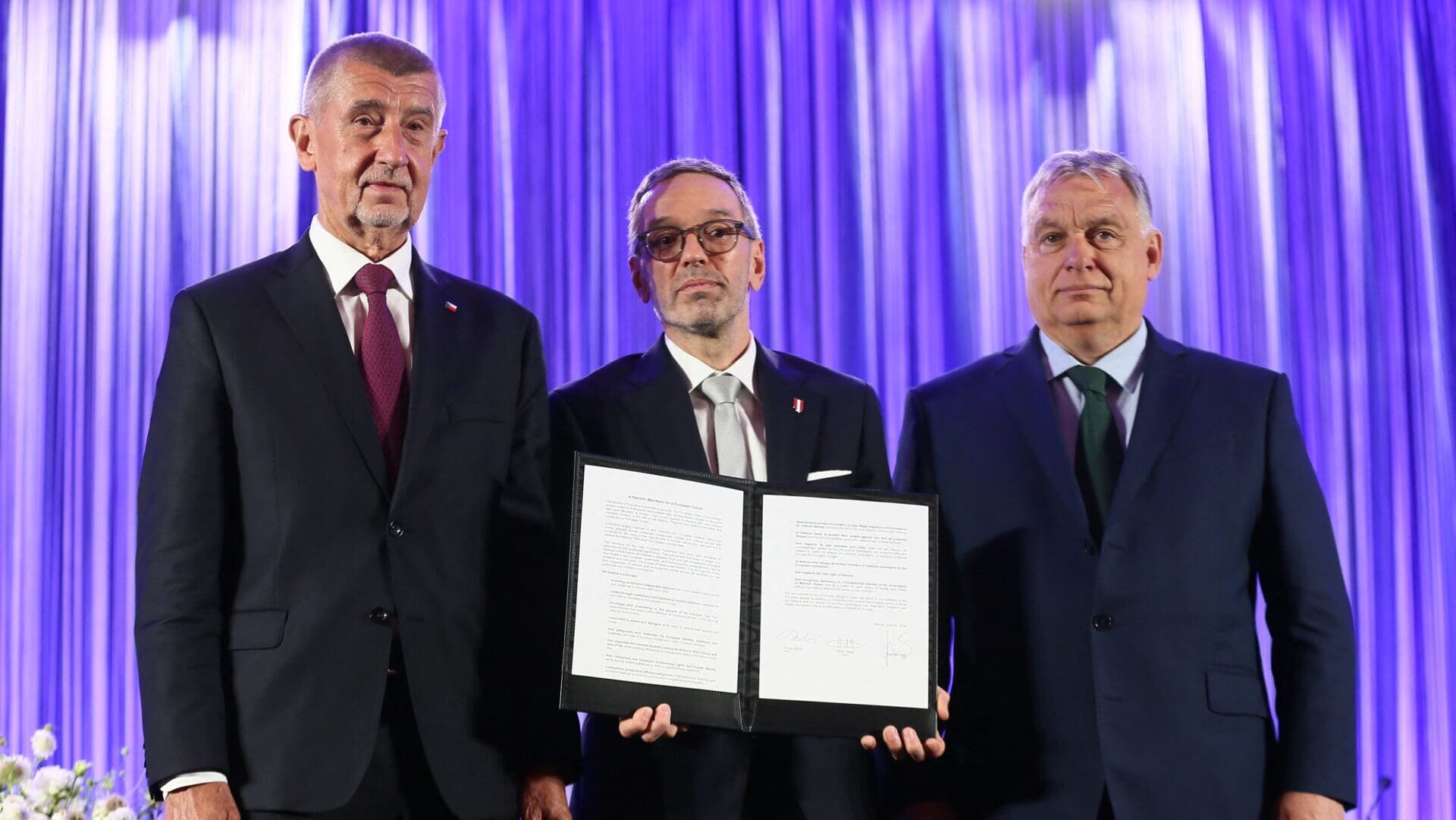Almost exactly three months ago Hungarian Prime Minister Viktor Orbán, Herbert Kickl, President of the Austrian Freedom Party (FPÖ), and Andrej Babiš, former Czech Prime Minister and Chairman of the ANO party, established the new right-wing sovereigntist political group, Patriots for Europe (PfE) in the European Parliament (EP). The PfE quickly gained momentum, expanding within weeks to become the third-largest faction in the new EP. The past few days have been particularly eventful for the PfE, as significant elections were held in two EU Member States, with preliminary analyses showing that the parties affiliated with the group—the FPÖ and ANO—emerged as frontrunners. In the Czech Republic’s regional and senate elections and the Austrian parliamentary elections respectively, Babiš’s ANO party and Kickl’s FPÖ secured victories, further consolidating the PfE’s position.
‘The voters have spoken with authority. It is a clear statement that things cannot continue like this in this country,’ Herbert Kickl stated on Sunday following the FPÖ’s historic victory. ‘We have opened the door to a new era. We are now truly going to write this new chapter in Austrian history together,’ he added. The right-wing coalition secured first place with 29 per cent of the vote, finishing two percentage points ahead of Chancellor Karl Nehammer’s party, the currently governing Austrian People’s Party (ÖVP). The biggest loss of the night was suffered by the centre-left Social Democratic Party (SPÖ), which recorded its worst result in history, placing third with 21 per cent of the vote. The liberal NEOS party received 9.2 per cent, narrowly ahead of the Green Party, which, as the outgoing coalition partner of the ÖVP under Nehammer, garnered 8.3 per cent—a decline of 5.6 percentage points compared to its 2019 results, according to Euractiv.
Saying No to War and Illegal Migration
Kickl’s FPÖ has gained considerable strength in recent years, and it was already evident during the European Parliament elections in June that they were poised to perform well in the current elections. The FPÖ’s policies closely align with those of Hungary’s governing parties Fidesz-KDNP. In its election program, titled ‘Fortress Austria,’ they advocate for the ‘remigration of uninvited foreigners,’ aims to create a more homogeneous nation through strict border control, and proposes suspending the right to asylum via emergency legislation. The party also calls for an end to sanctions against Russia, and highly critical of Western military support to Ukraine. Like Orbán, Kickl frequently criticizes the elites in Brussels and has called for taking back certain powers from the European Union to Austria.
The Hungarian prime minister was quick to congratulate his ally, posting on X: ‘Another win for the #Patriots: a historic victory for the #FPÖ in #Austria! Congratulations to Herbert Kickl!’
Another win for the #Patriots: an historic victory for #FPÖ in #Austria! Congratulations to Herbert Kickl!
— Orbán Viktor (@PM_ViktorOrban) September 29, 2024
However, the FPÖ’s victory does not guarantee that it will form a government. The day after the elections, the left-wing mainstream press was already discussing the possibility of an anti-Kickl coalition to prevent the FPÖ from taking power, thereby undermining the will of the electorate. Such a scenario would not be unprecedented, as right-wing parties have achieved notable successes in European Parliament elections across the continent, yet the EU leadership has largely remained under the control of the left-wing mainstream.
For instance, ÖVP leader and current chancellor, Karl Nehammer, has stated that he would not enter into a coalition with the FPÖ if Herbert Kickl were to be nominated as chancellor. However, he did not rule out the possibility of forming a coalition government if Kickl were to be sidelined, similar to the situation with Geert Wilders and the PVV in the Netherlands. On the other hand, analysts suggest that it is unlikely the ÖVP would align with the left against the FPÖ, raising hopes that the conservatives may respect the will of the electorate and form a right-wing government in the country.
Czechia Shifts to the Right Again?
Another key Central European country has recently held regional and senate elections, with Andrej Babiš’s ANO party emerging as the clear winner in the Czech Republic. In the regional elections, the former prime minister’s party secured victories in 10 out of 13 municipalities, gaining a total of 292 seats in regional councils. In the 81-seat Senate—where one-third of seats (27) were contested—ANO won 8 seats, marking the party’s best performance in senate elections to date. These dual electoral successes are promising for Viktor Orbán’s ally ahead of next year’s parliamentary elections. ‘The ruling coalition needs to take action, perhaps something quite radical in terms of policy adjustments and communication strategies, to counter the growing influence of the opposition,’ commented Czech political analyst Jiří Pehe following the elections.
‘The dual electoral success is promising for ANO ahead of next year’s parliamentary elections’
‘I would say that the ruling parties have a full year left to show the citizens of the Czech Republic that they are completely incompetent and unfit to govern, as they have demonstrated over the past three years,’ Babiš remarked following his landslide victory. While the current Czech government remains firmly committed to supporting Ukraine, Babiš’s stance on the issue aligns more closely with Hungary’s, a position that appears to resonate with the Czech electorate. When recently questioned about his position on the war, Babiš responded that ‘even the EU and NATO countries are not united on how to proceed in Ukraine,’ adding that Europe’s main objective should be peace. ‘But let us be realistic: the U.S. elections will decide the war in Ukraine,’ he stated, referring to the upcoming November vote in which former President Donald Trump faces Vice President Kamala Harris. He added that ‘a Trump win would be good for Europe because he has promised to end the war immediately.’
Patriots for Europe Growing Stronger and Stronger
Just as he did with Kickl, Viktor Orbán congratulated Babiš on X. ‘Congratulations to #ANO on their landslide victory in the second round of Senate elections in #Czechia. #Patriots are getting stronger day by day. Long live @AndrejBabis!’ he wrote. The Hungarian PM also visited the Czech Republic over the weekend to attend a celebration marking former Czech President Miloš Zeman’s 80th birthday. According to Orbán’s press chief, he held bilateral talks with Babiš prior to the ceremony.
Congratulations to #ANO on their landslide victory in the second round of Senate elections in #Czechia. #Patriots are getting stronger day by day. Long live @AndrejBabis!
— Orbán Viktor (@PM_ViktorOrban) September 28, 2024
Both the Austrian and Czech elections demonstrate that European voter attitudes are shifting. People are growing increasingly disillusioned with left-wing governments that neglect real issues, as well as mainstream parties that fail to address pressing concerns. As a result, they are turning to new right-wing forces for solutions. This shift is precisely why the Patriots for Europe was established in the first place—to unite these parties under one political group and to more robustly represent the genuine will of the European electorate on issues such as migration, the war in Ukraine, and Europe’s competitiveness, despite efforts by the traditional left-wing mainstream to suppress it.
If the FPÖ enters government, the Patriots will have four member parties in power within EU Member States. In contrast, the number of parties from the Socialists and Democrats (S&D) group in government continues to decline. There is no doubt that Europe is changing, and the PfE is harnessing the momentum of these changes, growing in significance and strength day by day, week by week.
Related articles:







